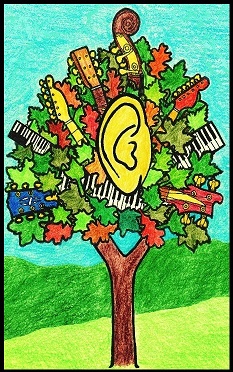 A common reason that music students don’t reach their goals is that many don’t have any goals to begin with. Too many people sign up for music school on auto-pilot, with no idea of what kinds of music they want to play, or what they intend to do once they learn to play.
A common reason that music students don’t reach their goals is that many don’t have any goals to begin with. Too many people sign up for music school on auto-pilot, with no idea of what kinds of music they want to play, or what they intend to do once they learn to play.
This applies especially to kids, but it’s the same with many adults. If you ask, “What kind of music do you listen to?” They don’t know, they don’t really listen to music much. “What do you want to play on piano/guitar/bass?” They haven’t really thought about it. Some people show up regularly, get into the routine, and discover they like playing music. But they are the exceptions. People with no musical direction usually don’t stick around for long.
Most parents don’t give much thought before enrolling their kids in music school. It’s just one more activity for them to try out. Maybe it’s the kid’s idea, maybe it’s the parent’s idea. Who knows?
Kid: “I thought you wanted me to take guitar lessons.”
Parent: “Because I thought you wanted to take guitar lessons. Remember that time you said you wanted to learn to play the guitar?”
Before you sign up for music school, you should think about what kind of music you want to play. Most guitar students will tell you they want to play some style of rock, country or blues. Most people like the same music as other people their same age. Except for students who are enrolled in school music programs, there isn’t much call for classical music, show tunes, or jazz.
Most People don’t have ambitious goals when they first start taking lessons because the prospect of learning a musical instrument is scary. Every beginning student worries that music might end up being too hard. Even so, you should have some picture of what you want to do with music when you can play. You should share your musical goals with your teacher, whether he or she asks you, or not. Small goals are still goals.
If you’re starting lessons, one of the main considerations is whether you want to play in a group with other musicians, like a rock band or an orchestra, or whether you want to play solo pieces instead. It’s okay to do both, but the technical preparation you need to play non-classical solo pieces on guitar or piano is different from the preparation you need to play in an ensemble. (This doesn’t necessarily apply to bass.) Learning solo pieces doesn’t really prepare you to play in a band, because the types of techniques you use are different. Also, you can’t play solo arrangements with an ensemble.
People have different motivations for learning an instrument. Some people don’t ever want to play in front of other people. Music is something they do to get away from people, and the stresses of everyday life. Others want to perform, but are nervous about the idea of playing in front of people. Some people want to play with other musicians in a chamber group or orchestra. Others want to play in round-table jams, or campfire jams, or in high-volume full-band settings. Some people want to write and record their own songs. Some people are drawn to the structure of music. Others are drawn to its complete lack of structure.
When bored students take on new projects, like preparing for a talent show or joining a group, they get serious. They start asking questions and taking charge of their lessons. The auto-pilot syndrome affects students, teachers and music school owners as well. It’s just one more result of conditioning by the Music Education Establishment.
© 2019, 2020 Greg Varhaug